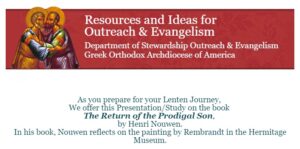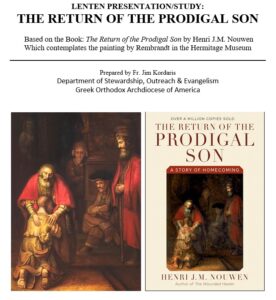INTRODUCTION
The entire Gospel is in this painting.
We can see our lives in this painting.
All the lives of our friends are here.
THE CHARACTERS
Then Jesus said, “There was a man who had two sons. The younger of them said to his father, ‘Father, give me the share of the property that will belong to me.’ So he divided his property between them.
- The younger son who took his inheritance and squandered it.
- The elder son who is responsible.
- The father, who welcomes home his prodigal son, and encourages the elder son to join him.
With whom do you identify with in this story?
THE YOUNGER SON
In the painting:
Ragged clothing,
Worn shoes,
Shaved head (implies servanthood),
Childlike – we are to come to God like children
Sword – the only thing that remains as a sign of his previous status.
A few days later the younger son gathered all he had and traveled to a distant country, and there he squandered his property in dissolute living. When he had spent everything, a severe famine took place throughout that country, and he began to be in need.
- How many of us have taken the gifts that God has given us – health, intelligence, physical ability, and wealth – and we keep using them to impress people, to receive acceptance and praise, to compete for rewards.
- All we have has been given to us by God. Wouldn’t it be better to develop our gifts and use them for the glory of God?
- Or do we do what the younger son did? – take our gifts off to a “distant country,” putting them to use in a world that doesn’t understand their true value.
- The father didn’t force his younger son to stay home. He had to let him go, although he knew the pain that it would cause both of them. His love has no strings attached. He let his son go to find his own life, even at the risk of losing it.
- God loves us so much that were are free to leave Him. He could force us to love Him, but what kind of love would that be?
- He gives us free will – free will to stay or to leave. He loves us either way. But if we leave, His arms are always outstretched to receive us back as His beloved sons and daughters.
- The hands of the father have been outstretched, whether or not the shoulders of the son were there.
- God never pulls back His arms, never stops loving His sons and daughters.
- Is there a sin so great that God can’t or won’t forgive it?
When he had spent everything, a severe famine took place throughout that country, and he began to be in need. So he went and hired himself out to one of the citizens of that country, who sent him to his fields to feed the pigs. He would gladly have filled himself with the pods that the pigs were eating; and no one gave him anything. But when he came to himself he said, ‘How many of my father’s hired hands have bread enough and to spare, but here I am dying of hunger! I will get up and go to my father, and I will say to him, “Father, I have sinned against heaven and before you; I am no longer worthy to be called your son; treat me like one of your hired hands.” ‘ So he set off and went to his father.
- What happens to the son in the distant country?
- Besides all the financial and physical consequences of his actions – what were the inner consequences of leaving home?
Q. What happens to us when we put a distance between God and ourselves?
- The further we get from where God dwells, the harder it is for us to hear the voice that calls us beloved son & daughters.
And the less we hear His voice, the more we get entangled in the manipulation and games of the world.
Maybe it goes something like this:
- I see other people who are better off than I am – they are more popular, better looking, they have nicer clothes, nice cars.
- I wonder how I can get to where they are.
- I try hard to be popular, to look good, and to be recognized.
- When I fail, I get jealous & resentful.
- And when I succeed, I worry that others will be jealous or resentful of me.
- Getting all tangled up in this thinking, I worry that I won’t get what I want or I might lose what I already have.
- I lose my trust in people.
- I wonder if anyone ever really loved me.
- I get depressed.
- My life loses meaning.
- I am a lost soul.
So he went and hired himself out to one of the citizens of that country, who sent him to his fields to feed the pigs. He would gladly have filled himself with the pods that the pigs were eating; and no one gave him anything.
The younger son in the parable realized how lost he was when he say that no one showed the slightest interest in him. When his money was gone, they had no further use for him. He was alone in a foreign land with no money and no friends.
- What was it at this low point that made the son choose life?
- He remembered that he is his father’s son. He remembered who he was on the inside. (Note that the prodigal son still wears his sword, though he has lost everything else. He still has the sign of his sonship.
JUDAS AND PETER
· What did Judas do? – he betrayed Jesus
- What did Peter do around this same time? – he denied Jesus.
- Both Peter and Judas were lost.
- What was the difference between the two?
- Judas couldn’t hold onto the truth that he remained God’s child. So he killed himself.
- But Peter repented and returned to Jesus, becoming the Rock on which Christ built his Church.
I will get up and go to my father, and I will say to him, “Father, I have sinned against heaven and before you; I am no longer worthy to be called your son; treat me like one of your hired hands.”
The prodigal is going back to his father, but he thinks that he is no longer worthy to be called his son. He is willing to come back as a slave.
- Is this how God welcomes us back?
God welcomes us back just like the father in this story. It is up to us to forgive ourselves and to receive God’s forgiveness.
THE ELDER SON
“Now his elder son was in the field; and when he came and approached the house, he heard music and dancing. He called one of the slaves and asked what was going on. He replied, ‘Your brother has come, and your father has killed the fatted calf, because he has got him back safe and sound.’ Then he became angry and refused to go in.
On the 4th Sunday before Great Lent, the Gospel we read in church is the parable of the Publican and the Pharisee. Then on the next Sunday, we read the parable of the Prodigal Son.
- What do these parables have in common?
Look at the painting. You see the well-dressed brother standing in an elevated area looking at the returning son – his brother.
Is he like the Pharisee who thanks God that he is not like the Publican?
Some of us may be more like the elder brother than the Prodigal son – we always do the right thing, the responsible thing.
But we get resentful – maybe even bitter that we have all these expectations that are made of us.
And we become envious of those who are irresponsible – who seem to be having such a good time.
Nothing seems to be expected of them.
His father came out and began to plead with him. But he answered his father, ‘Listen! For all these years I have been working like a slave for you, and I have never disobeyed your command; yet you have never given me even a young goat so that I might celebrate with my friends. But when this son of yours came back, who has devoured your property with prostitutes, you killed the fatted calf for him!’
Q. Who is more lost? — the younger son or the elder son?
We can be lost while we are still at home.
We can be lost in judgement, anger, resentment, jealousy – things that really do damage to our heart.
What does more damage, the actions of the Prodigal son or the actions of the elder son?
What do you think the elder son finally did? Did he go in? Does he stay lost in resentment? He has a choice.
The parable doesn’t tell us.
What we do know for sure is the heart of the father. His love and forgiveness is unlimited.
So, who do you identify with in this story?
Whether we are the younger son or the elder son, the father’s only desire is to bring us home.
He loves us and waits for us no matter what.
- Does the father love one son more than he loves the other?
- He goes out to them both to bring them in.
THE FATHER
The father loves both his sons equally.
He is overjoyed that his younger son has returned, but he doesn’t forget the elder son. He left the party and goes out to persuade him to join them.
God’s love does not grade on a curve. We don’t need to compete with each other for his love. There is unlimited room for us in his love. If we do our best and truly repent & ask forgiveness for our mistakes – no matter how big – he will always welcome us home.
SCRIPTURE
Luke 15:11-32 New King James Version
The Parable of the Lost Son
11 Then He said: “A certain man had two sons. 12 And the younger of them said to his father, ‘Father, give me the portion of goods that falls to me.’ So he divided to them his livelihood. 13 And not many days after, the younger son gathered all together, journeyed to a far country, and there wasted his possessions with [a]prodigal living. 14 But when he had spent all, there arose a severe famine in that land, and he began to be in want. 15 Then he went and joined himself to a citizen of that country, and he sent him into his fields to feed swine. 16 And he would gladly have filled his stomach with the [b]pods that the swine ate, and no one gave him anything.
17 “But when he came to himself, he said, ‘How many of my father’s hired servants have bread enough and to spare, and I perish with hunger! 18 I will arise and go to my father, and will say to him, “Father, I have sinned against heaven and before you, 19 and I am no longer worthy to be called your son. Make me like one of your hired servants.” ’
20 “And he arose and came to his father. But when he was still a great way off, his father saw him and had compassion, and ran and fell on his neck and kissed him. 21 And the son said to him, ‘Father, I have sinned against heaven and in your sight, and am no longer worthy to be called your son.’
22 “But the father said to his servants, [c]‘Bring out the best robe and put it on him, and put a ring on his hand and sandals on his feet. 23 And bring the fatted calf here and kill it, and let us eat and be merry; 24 for this my son was dead and is alive again; he was lost and is found.’ And they began to be merry.
25 “Now his older son was in the field. And as he came and drew near to the house, he heard music and dancing. 26 So he called one of the servants and asked what these things meant. 27 And he said to him, ‘Your brother has come, and because he has received him safe and sound, your father has killed the fatted calf.’
28 “But he was angry and would not go in. Therefore his father came out and pleaded with him. 29 So he answered and said to his father, ‘Lo, these many years I have been serving you; I never transgressed your commandment at any time; and yet you never gave me a young goat, that I might make merry with my friends. 30 But as soon as this son of yours came, who has devoured your livelihood with harlots, you killed the fatted calf for him.’
31 “And he said to him, ‘Son, you are always with me, and all that I have is yours. 32 It was right that we should make merry and be glad, for your brother was dead and is alive again, and was lost and is found.’ ”
Scripture Footnotes
- Luke 15:13 wasteful
- Luke 15:16 carob pods
- Luke 15:22 NU Quickly bring



